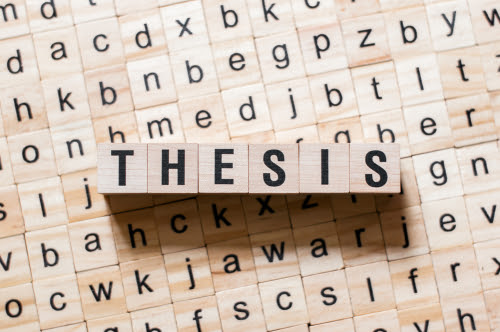Thesis, Dissertation: What’s the Difference?
Most people looking into graduate work already know that to earn a master’s degree or doctor’s degree, they will need to write a thesis or dissertation. What might not always be clear is how the two words are used and what they mean in the context of academic research and writing.
Do the two words mean the same thing? If they don’t have the same meaning, in what ways are they similar, and in what ways are they different? This article will help you get an idea of what thesis and dissertation mean in the context of modern education.
A Look at the History of the Terms
An ancient philosopher and linguist once noted that the first thing that someone wanting to learn about a topic must do is first gain a sound grasp of the meaning of the words that are used to describe or explain what they’re interested in. Taking this first step will help you establish a reliable, knowledge-based foundation. This is because, in many ways, the words we use carry within themselves the meanings of the ideas or topics we are learning about.
When we hear words like thesis or dissertation, we often imagine large books containing oceans of words, a lot of time in libraries or laboratories, and a lot of work. If this is roughly what thesis or dissertation conjures in your mind, you’re not far from the truth, but there is more to the story.
It is undoubtedly true that writing a thesis or dissertation requires a great deal of study and research. However, there are essential differences between a dissertation and a thesis that have developed throughout history. And, the two words are understood and used in different ways in different times and places. Let’s take a look at the original meanings of thesis and dissertation.
The Greek Roots of Thesis

Thesis has Greek roots. It is a transliteration of the same Greek word, which, according to Liddell and Scott’s Greek-English Lexicon (1897), means “a setting, placing, arranging.” This noun’s verbal counterpart is the Greek tithemi, which means “to set, to put, to place.”
Two important characteristics of these definitions stand out. First, something is specified or marked out and placed before the focus of our attention. Second, things are arranged so as to focus our attention on whatever has been selected for emphasis as well as to provide reasons for thinking that the description is really the case or at least a good explanation.
A thesis, therefore, states something particular about a given topic. As a silly example, one might want to argue that “The moon is a giant disk in the night sky composed of green cheese.” We know this isn’t true, but the statement itself is an arguable assertion that could be supported by evidence.
More importantly, the stuff out of which the moon is composed is “green cheese.” Whether or not the statement is true, it can be understood as a thesis statement the focusses the reader’s attention on what the moon is made of: green cheese.
Supporting reasons could be then given that would help convince the reader that the thesis statement is true. For example, the moon’s color, a kind of greenish hue, the texture, pock-marked like Swiss cheese, etc., could be used in support of the writer’s assertion that the moon is made of green cheese.
The two essential historical and linguistic ideas of a thesis, therefore, are an arguable assertion with organized supporting reasons to convince readers to believe the original claim. The original connotations of thesis will take on a life of their own in the world of academic writing in a way that extends the original meaning of the Greek thesis while remaining rooted in the term’s etymological roots.
The Latin Roots of Dissertation

Our English term, dissertation, has roots in the Latin language. It comes from both verb and noun forms of a Latin term that is related to the Greek-based term thesis. The noun form of the word is dissertatio, which one can readily see is connected to our English term. According to Cassell’s Latin-English Dictionary, the word means “an examination… or discussion” of a given topic. The verb form of the same word is disserere. It merely means “to examine, to treat, to discuss” a given topic. This is a pretty general definition, but it communicates the ideas that something is being (carefully) considered and discussed in an orderly way.
The notion of an orderly examination is especially important. This is because, as with a thesis, a dissertation intends to convince its readers of a certain conclusion or set of conclusions. To do this, a dissertation must be orderly in terms of its presentation of evidence. It must move from premises to a conclusion.
We’re now in a position to understand that linguistically thesis and dissertation are closely related. They both contain the ideas of an orderly and transparent presentation of evidence that leads to a conclusion or set of findings the presenter wants their readers to both grasp and agree with. Thesis more clearly conveys the idea of presenting an argument, while dissertation emphasizes the care with which the researcher examined the evidence and reasoning. Both approaches can and should co-exist and complement one another.
Modern Roots of Thesis and Dissertation in Medieval Universities
However, according to how they were employed in their original academic context in the medieval university, the terms were not interchangeable. This is because a thesis was often merely a statement-making an assertion that was to be proven through the gathering and application of evidence. Hence a work could contain a high number of theses.
The evidence organized and presented, in turn, was called the dissertation. It gave reasoning and argumentation that supported the thesis. So, in the context of early universities, thesis referred to the conclusions argued for, and dissertation referred to the actual presentation of arguments and evidence.
Modern Academic Use of Thesis and Dissertation
When we come to our current academic context in the United States, we will see how the uses of the terms thesis and dissertation have changed from their original meanings in Greek and Latin, as well as what they’ve kept of their ancient definitions.
Over time, thesis came to be used for significant research projects at both the undergraduate and graduate levels. In many European countries, a doctoral dissertation is also called a doctoral thesis. But, writing a thesis is not limited to those earning a doctorate.
Undergraduates sometimes are required to complete a bachelor’s thesis. A thesis is typically required to earn a master’s degree, as well. Although doctoral dissertations are often called doctoral theses, there doesn’t seem to be a similar practice of calling bachelor’s and master’s theses dissertations.
So, What’s the difference between a Thesis and a Dissertation?
Now that we know a little more about the origin of the terms, thesis, and dissertation, and the changing ways academia has used these words in the past, we can see how our understanding of these words has changed. Our situation in the United States has its unique characteristics.
While undergraduates in individual colleges and universities are still required to write a significant research thesis for the bachelor’s degree, this is not the norm. Instead, thesis is most often associated in the United States with a master’s degree.
The Master’s Thesis
A thesis initially referred to an arguable assertion that was supported through an organized presentation of evidence. This implied that original discovery and argumentation were emphasized in a thesis. This is no longer the case.
Nowadays, a master’s thesis is not so much a display of original research and argumentation. It is, instead, a large research project that demonstrates mastery of the state of the question and current research. In a master’s thesis, one gathers and organizes the research of others to provide commentary on the topic of the thesis. Its purpose is usually not to present an original argument or to advance current research. Critical thinking and research skills are prioritized for a master’s thesis in terms of evaluating others’ arguments.
In the scientific fields, after completing graduate-level coursework, master’s students will often engage in direct research on a particular topic or area. Unlike doctoral students, their research will be more closely guided by a master’s thesis director. Again, this is because, at the master’s level, the purpose is not so much original research but demonstrating that one has a handle on existing research, and can gather, organize, and critically interact with this research.
Usually, a master’s thesis will be between 80 and 100 pages, but they can be longer than this as well. A typical master’s thesis will have a table of contents, and several sections divided into chapters. An introduction and conclusion help guide its readers in identifying the main questions and topics of the thesis and the critical points to take away from the thesis.
A Master’s degree candidate writing a master’s thesis will have a primary director as well as one or two secondary readers.
The Doctoral Dissertation
As mentioned above, the doctoral dissertation is a kind of thesis because its purpose is to use evidence and arguments in support of an arguable assertion about a topic. However, a doctoral dissertation is much longer than a master’s thesis and has a different purpose than a master’s thesis. Where a master’s thesis will be around 100 pages, a doctoral dissertation will almost always be at least 200 pages. Often, a doctoral dissertation will run well beyond 200 pages. Plus, a doctoral dissertation intends to advance current research and scholarship. This is a broader scope than a master’s thesis because new knowledge is presented and demonstrated, not merely mastery of contemporary scholarship.
As the culmination of a doctoral degree, presenting new ideas and information, the stakes are a lot higher in a doctoral dissertation than in a master’s thesis. A dissertation is also much larger than a thesis and requires much more extensive research. Finally, the task of formulating, organizing, and presenting new theories and discoveries is more complicated and needs greater care than showing currently held positions.
Both a master’s thesis and a doctoral dissertation require proposals that outline their main topic and sources. A dissertation proposal will present the proposed dissertation’s research methodology, the body of scholarly literature that will be engaged, the dissertation’s main argument or thesis, anticipated chapters, and bibliography.
Getting a dissertation proposal approved, however, is more complicated than for a master’s thesis proposal. Before moving to the writing of a dissertation, a dissertation proposal committee of 4 to 6 people will critically examine a dissertation proposal. Members of this committee will discuss its topic, methodology, thesis, scope, and sources critically, along with many other aspects of the project. The proposal must then be adjusted or corrected according to the criticisms of the dissertation committee before it can be approved, and one can begin writing.
Once a proposal is approved, expect to take 2-4 years researching and writing the doctoral dissertation. During the process of research and writing, one will work with a dissertation director, who will help the writer stay focused, on task, and on topic. After the dissertation is complete, it must be publicly presented and defended by the author. A dissertation committee (as distinct from a proposal committee) made up of 3 to 4 members, including the dissertation director, examine the dissertation’s arguments, methodology, and conclusion.
In the dissertation defense, members of the dissertation committee challenge the author to defend specific ideas, statements, evidence, and findings presented in the dissertation to see if its claims stand up to scholarly scrutiny and represent genuine advances in the field.
Think Long-Term: Pick the Right Topic
For every doctoral student and candidate, the completion of a doctoral dissertation is the pinnacle of their education. As a terminal degree, a doctorate is a final degree that one can earn. And, as the product of years of hard work, researching, and writing, the completion of one’s dissertation is a great accomplishment. It is a testament to hard work, perseverance, and creativity.
Beyond just being a significant research project and a contribution to scholarship, for many who write a doctoral dissertation, the dissertation itself becomes the seedbed of future research and writing.
Given the considerable commitments of time and work that both a master’s thesis and a doctoral thesis require, it’s vital that the topic one chooses to research and write about is a good one. Moreover, especially with the doctoral dissertation, since the topic of one’s dissertation will likely shape later professional research and writing, they will want a topic that will keep their interest and be meaningful.
This is where thesis and dissertation directors and readers, as well as, for a dissertation, proposal committee members are so important. They will help young scholars avoid going down scholarly blind alleys and dead ends by assisting them in weeding out topics that have already been dealt with, establishing a manageable scope for their subject, and providing suggestions regarding current scholarly literature and research.
As the poet T.S. Eliot once wrote, “In my beginning is my end.” It is true, the thesis and the dissertation are the final stages of education. They are also, however, most often new beginnings, either in professional careers or in academic contexts that will continue to spur scholarly research and composition long after the master’s degree or doctorate has been granted.
What are the disadvantages of a thesis or dissertation?
Here are some points to consider:
- Lengthy and Time-Consuming: Writing a thesis or dissertation can be a lengthy and time-consuming process. It can take months or even years to complete, depending on the topic and research.
- Limited Resources: When writing a thesis or dissertation, you are often limited in terms of resources and access to experts and professionals. You may have to rely heavily on your own research and writing skills.
- Stress and Pressure: Writing a thesis or dissertation is a stressful experience and can come with a lot of pressure. You may feel you are under intense scrutiny from your professors and peers.
- Isolation: Writing a thesis or dissertation can be an isolating experience, as you may not have access to the same support system you would have if you were writing a paper or essay. This can lead to feelings of loneliness and burnout.
- Difficulty Finding Relevant Sources: Finding relevant and reliable sources can be difficult when writing a thesis or dissertation. You may have to search through libraries and archives or even conduct in-depth interviews to find the information you need.
